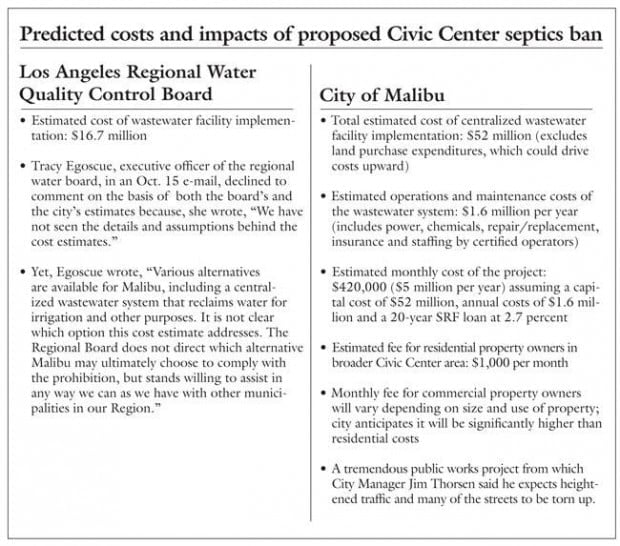In addition to estimated $1,000 per month fees that could be levied against
homeowners to build a wastewater treatment facility, the possibility of $10,000 fines and other unknown costs could affect the residential and commercial real estate markets.
By Olivia Damavandi / Assistant Editor
With the possibility of a septic systems ban within the broader Civic Center area looming, many are anticipating the negative impacts it could have on Malibu’s residential and commercial real estate markets.
Possible repercussions feared include increased rent rates and unobtainable real estate financing, among others. And although the Los Angeles County Regional Water Quality Control Board will vote this Thursday whether to implement the ban, some say the mere threat of it has already injured market values.
“People aren’t sure what’s going to happen, so it’s difficult to make decisions as a homeowner and a buyer when you don’t know what’s being addressed,” Michael Novotny, manager of Prudential Malibu Realty, said last week in a telephone interview. “It’s become an issue to buyer and sellers, not knowing what you can and can’t do with properties. And that can impact values. In today’s market, buyers could ask for lowered home prices because of the unknown factors.”
The regional water board’s staff recommends a plan to phase out the utilization of septic systems in most of the eastern portion of Malibu, due to its assessment that they are the major cause of pollution of Malibu’s watershed. The plan includes an end to future permitting of septic systems in the commercial areas of the Civic Center and the stretch of Pacific Coast Highway from Serra Road to Sweetwater Canyon, as well as the residential areas of Malibu Colony, Malibu Road, Serra Retreat, Sweetwater Mesa and the Malibu Knolls.
The city two weeks ago announced that 400 to 500 residential property owners will have to shell out $1,000 per month to help finance an estimated $52 million centralized wastewater treatment facility if the septic ban is approved. The price tag for commercial property owners will vary greatly depending on the size and use of their property, but the city anticipates it will be significantly higher than residential costs.
Also, all current septic systems in those areas would have to be phased out within five years, which some say further complicates matters. The water board could issue fines of up to $10,000 per day or $100 per gallon of wastewater discharged to those who do not comply.
“As a real estate agent, it’s difficult to explain definite costs or what this will mean because so many issues are unresolved,” Novotny said. “For those remodeling, it’s not knowing how to advise them on whether to put in a new onsite wastewater system or not. That’s why it’s a problem right now, especially with this five-year window period.”
If the regional board votes to implement the ban, the State Water Resources Control Board must still approve it before it can be enacted. City Manager Jim Thorsen two weeks ago said the city could sue the state board, but that no statements would be made until a final decision is reached.
Local real estate is already hurting due to the recession, as both sale prices and the number of sales this year have been dramatically fewer. While the median price in Malibu has dropped about 33 percent in 2009, buyers have refused to jump into the market, Realtor Rick Wallace reported this month.
Some local Realtors are concerned that a septic ban would further maim home sales, not because potential buyers couldn’t afford to pay the $1,000 monthly residential sewer cost, but because financing could become even more difficult to obtain.
“If the city files a lawsuit, they might put the [septic] moratorium on hold,” local architect Michael Barsocchini said last week in a telephone interview. “But can you get financing if you have that hanging over a potential property? I’d think you can’t.
“How can you buy a house in that area when facing an unknown assessment? How do people get financing to buy a house?” Barsocchini said. “Right now you can’t get financing for one million to two million-dollar purchases … people would probably have to do private financing …”
Chris Cortazzo, a local Realtor with Coldwell Banker, last week said the proposed septic ban would be “a huge hit” for residents barely making ends meet and who may have to sell their homes.
“A lot of people are on fixed retirement,” Cortazzo said. “There’s always a perception from the outside world that Malibu is wealthy, but a lot of locals are school teachers and plumbers, and I feel for them.”
The hefty monthly sewer costs may also drastically change Malibu’s commercial real estate landscape as it would affect churches and schools, such as Our Lady of Malibu, that are already facing financial struggle.
“If it’s a retail operation, rents will increase, and they’re already high if you listen to what tenants say now,” Barsocchini said. “It’ll probably drive tenants out that are marginal right now.”
However, Malibu County Mart owner Michael Koss last week said that Barsocchini’s prediction is meaningless because the city’s estimate costs could change. “I think it’s silly to talk about [rents rising] at this time. They could go down. I think it’s all speculation,” he said in a telephone interview.
City Manager Thorsen on Tuesday acknowledged that because many unknowns exist, even with the city’s $52 million estimate, the cost will vary depending on what type of wastewater system is ultimately constructed.
“Could it go up higher? Yes,” Thorsen said. “We’re still looking at cost.”
The Regional Water Quality Control Board’s hearing will take place Nov. 5 at the Metropolitan Water District of Southern California, 700 N. Alameda St., in Los Angeles at 9 a.m. The City of Malibu will provide free bus transportation. More information can be obtained by calling 310.456.2489 ext. 224.

